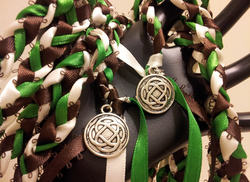But no biggie! The majority of Pagans would point to these dates as Beltane anyway. It makes it easier to organize stuff in advance. No-one is going to sniff at April 30th-May 1st as the time for your Beltane handfasting.
(And if they do, they're being Witchier Than Thou. Laugh in their face and tell them that a High Priestess said to do so.)
However, some of you may wish to keep it as real as possible. Therefore you'll need to skip beyond the Gregorian Calendar to discern when summer begins in your handfasting year.
Many of our Beltane traditions derive from those held in Ireland, Scotland and Newfoundland in Canada, which never did quite die out over the centuries. The rituals in Limerick have especially been a wealth of inspiration.
But if you're looking for a handfasting based on Irish traditions, disdain Beltane entirely. This is the Sabbat which marks the Great Wedding between the Goddess and the God. Do you really want to upstage that?
Plus the Irish thinking is that Beltane weddings are meant to be temporary, Greenwood affairs. If you want your union to last, then May Day might not be the most auspicious date. I've explored some of the legends in the two articles below, which will enable to you to make up your own mind about whether the Irish are onto something here.
















 St Tydecho's Churches in West Waleson 09/03/2014
St Tydecho's Churches in West Waleson 09/03/2014
 Goodies for an Outlander Premiere Partyon 03/06/2015
Goodies for an Outlander Premiere Partyon 03/06/2015
 Holocaust Memorial Day Interview with Rainer Höss, Grandson of Rudolf Architect of Auschwitzon 01/24/2015
Holocaust Memorial Day Interview with Rainer Höss, Grandson of Rudolf Architect of Auschwitzon 01/24/2015
 Romantic Valentine Gifts for an Outlander Fanon 01/16/2015
Romantic Valentine Gifts for an Outlander Fanon 01/16/2015



Comments
Hello there! It's strange to see you outside our usual haunt. Glad to see you here too though.
I'm glad that you found the article interesting.
Interesting to learn about this type of wedding.
If you are studying world faiths. there are the big six that you mentioned below, but there are some smaller ones, which deserve mention and which you might encounter. You have mentioned paganism, but there is also the Zoroastrian [Parsee] faith, which is small but historically influential and represented in Britain. There is Bahai. Some people regard the Bahai faith as a sect of Shia Islam, but others regard it as a faith in itself. Then there is Jainism, which some regard as part of Hinduism. There's much to learn.
Nice one! I was going to do a comparative religion one for Beltane/May Day, but ran out of time.
Reading on the bus sounds good. :)
I'll let you know how it pans out. I'm hoping they'll have handouts, but that's because I like reading something I can refer back to. My logical-Spock writer's brain can then play around with comparisons and contrasts to its bear-of-little content. And, who knows, there may be an article in there too.
I've read some of Frank's work but need to revisit his wizzography, because I think there are probably articles I've missed in the times I've dropped out. Thanks for the reminder. That'll be a plan for after the deadline is met; end of June. Long summer days with less pressing deadlines once that's over with. And my new phone should allow me to read on the bus instead of having to wait until I arrive home. Win-win.
Oooh! That project sounds amazing! I would love to join in with something like that too.
That's another reason why I love Wizzley, because there are people of different faiths (or non-faith too), who are genuinely informative. (Have you read any of Frank Beswick's stuff on Christianity?)
The fashion these days seems to be for scientists to keep quiet on their beliefs. They may well have a major faith but choose not to share it. I think the media may have some part in that.
Patient-facing medical staff, of course, are usually not permitted to (they are not allowed to force their belief on a patient at any rate). That's what members of the hospital chaplaincy team are there for. Said team in my current place of work, a multi-cultural and multi-faith collection of people, does a wonderful job of adhering to every major strand of worldwide spirituality.
They are undertaking a summer-long project to inform the rest of us about the differences in their beliefs, and I'm looking forward to learning as much about Hindusim, Sikhism, Judaism, Buddhism and Islam as I do about Pagan and the bits of Christianity I forgot or chose to ignore already.
Isaac Newton was very religious. :)
I have yet to find a research scientist or science lecturer who has any major religious belief. Their research tends to lead them to atheism in this neck of the woods. (And I speak as a Christian in Cambridge, so no shortage of serious academic bookish and laboratory-bound types hereabouts.)